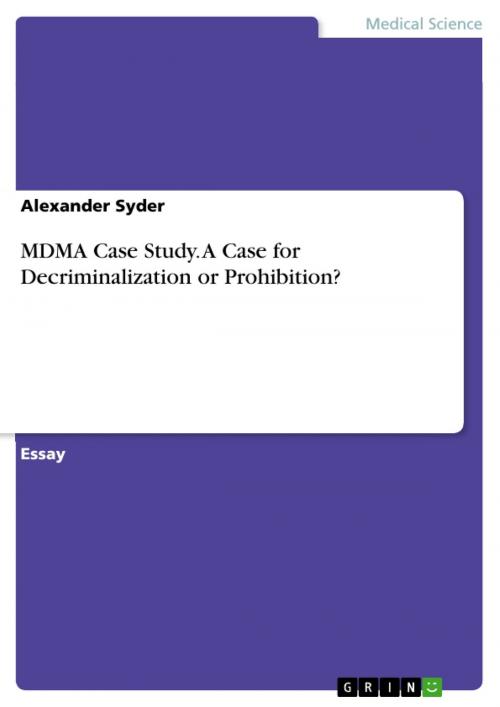MDMA Case Study. A Case for Decriminalization or Prohibition?
Nonfiction, Health & Well Being, Medical, Specialties, Internal Medicine, Neurology| Author: | Alexander Syder | ISBN: | 9783668046870 |
| Publisher: | GRIN Verlag | Publication: | September 16, 2015 |
| Imprint: | GRIN Verlag | Language: | English |
| Author: | Alexander Syder |
| ISBN: | 9783668046870 |
| Publisher: | GRIN Verlag |
| Publication: | September 16, 2015 |
| Imprint: | GRIN Verlag |
| Language: | English |
Essay from the year 2015 in the subject Medicine - Neurology, Psychiatry, Addiction, grade: Merit, Sheffield Hallam University (Sheffield Hallam University), course: MSc Psychology, language: English, abstract: MDMA has become one of the most popular, recreational drugs in the westernized world. Although the use of MDMA has become increasingly widespread, there exists a serious debate amongst the psychiatric researchers as to whether MDMA (ecstasy) is a potentially dangerous and lethal drug to the individual using the substance. There is however an opposing argument amongst a group of researchers that MDMA has therapeutic benefits that can be used for self-healing, alleviating social anxiety and problems with social integration in a psychotherapeutic environment. The media and state politicians in western countries have however been pursuing a discourse of promoting MDMA as the same status as cocaine and heroin, with the same psychological and physiological properties; the reason is partially political with the populist stance of political parties to be seen as tough on drugs, often referred to as the 'War on Drugs' coined by President Nixon in 1971. There is a divide therefore on the issue of MDMA as to whether this is a debate on the nature of the drug and its effects. Studies have been aimed at defining ecstasy from a premise of whether the effects are bad or good, studies leaning towards one of the observations typically rather than allowing for equal debate; the research can become political as opposed to unbiased scientific research, as Meyer's (2013) argues research into ecstasy has come from its most vociferous detractors and the most ardent supporters. The studies of beneficial effects are nonetheless increasingly limited, with little opportunity to test this proposed hypothesis. For instance in the US, the DEA has categorized MDMA as a Schedule 1 drug, a drug that through its classification is considered incredibly dangerous with high federal penalties for the possession and supply of the drug.
b044>
Essay from the year 2015 in the subject Medicine - Neurology, Psychiatry, Addiction, grade: Merit, Sheffield Hallam University (Sheffield Hallam University), course: MSc Psychology, language: English, abstract: MDMA has become one of the most popular, recreational drugs in the westernized world. Although the use of MDMA has become increasingly widespread, there exists a serious debate amongst the psychiatric researchers as to whether MDMA (ecstasy) is a potentially dangerous and lethal drug to the individual using the substance. There is however an opposing argument amongst a group of researchers that MDMA has therapeutic benefits that can be used for self-healing, alleviating social anxiety and problems with social integration in a psychotherapeutic environment. The media and state politicians in western countries have however been pursuing a discourse of promoting MDMA as the same status as cocaine and heroin, with the same psychological and physiological properties; the reason is partially political with the populist stance of political parties to be seen as tough on drugs, often referred to as the 'War on Drugs' coined by President Nixon in 1971. There is a divide therefore on the issue of MDMA as to whether this is a debate on the nature of the drug and its effects. Studies have been aimed at defining ecstasy from a premise of whether the effects are bad or good, studies leaning towards one of the observations typically rather than allowing for equal debate; the research can become political as opposed to unbiased scientific research, as Meyer's (2013) argues research into ecstasy has come from its most vociferous detractors and the most ardent supporters. The studies of beneficial effects are nonetheless increasingly limited, with little opportunity to test this proposed hypothesis. For instance in the US, the DEA has categorized MDMA as a Schedule 1 drug, a drug that through its classification is considered incredibly dangerous with high federal penalties for the possession and supply of the drug.
b044>















